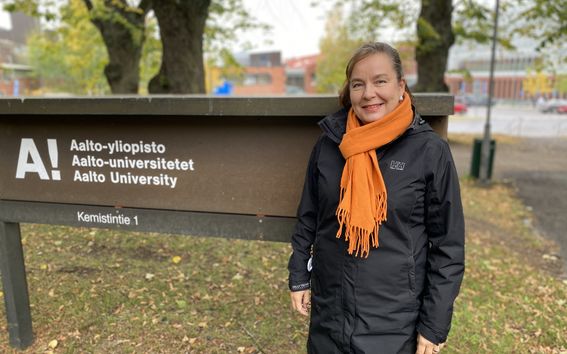Anu Kaukovirta has been selected as the School of Chemical Engineering's Alumnus of the Year 2020

Why did you want to study chemical engineering? Did you have a clear plan after high school?
I was always interested in biology and chemistry and wanted a practical perspective on these. I studied biochemistry, food technology and biotechnology as majors. I did have the idea that I wanted to study industrial biotechnology. This was a cool thing already at the end of the 1980s and perhaps even more so today, a field of the future. I was fascinated by the idea that biotechnology was adapted to industry and processes based on natural materials were developed on an industrial scale.
Do you have memorable memories from your studies?
What stuck most was the mingings between chemists and physicists and many singing evenings. During my studies, everything was more home-made and not as well organized as it is today. Excursions were absolutely awesome, there are amazing memories of them, the group work was nice too, because they welded together.
What have been the most useful things in your studies in working life?
The substance studies in the final years were important and helped to gain a good idea of the industry. The right combination of subjects provides good basic skills for working life, even though on-the-job learning is continuous. Networks are an absolute priority, social networking cannot be over-emphasised.
How do you maintain expertise?
My work has been in management for a long time, so I read related articles. The education in Aalto provided a good readiness to seek information, and the desire to understand and learn more about things. Studies and research have resulted in routine retrieving background information. I read a lot of professional literature.
What kind of positions have you held since graduation?
During my doctoral thesis, I worked as an assistant, did various projects and, of course, I did research. I then moved to VTT leading a group at a rather young age. At best, 500 people worked in the research area, which I eventually led at VTT. I then continued to food industry and worked as a head of research and innovation, and now I am once again a director of a research organisation.
Anu KaukovirtaThe most important turning point in my career has been the choice between a specialist and leadership career.
What have been important turning points in your career?
The most important turning point was to give up your own substance career. I understood that leading people and entities is my thing. The most important turning point in my career has been the choice between a specialist and leadership career.
Have you had any important people who supported you during your career?
My own professor, Simo Laakso, has been one of the most important supporters early in my career. I graduated at the deepest depression, but I had worked as an assistant and in the School lab. I got a scholarship for a doctoral thesis related to the brewing industry. I was able to collaborate with people in industry, including legendary research director Juhani Olku, and they brought concrete and real industrial issues and cases to my research. Important supporters of my later career have included Research Professor Kaisa Poutanen and Director of VTT, Kari Larjava, who initially mentored me in management and leadership and later became my supervisor, who gave a great amount of responsibility and freedom, but also advice and support whenever necessary.
What kind of greetings would you like to send to students of chemical engineering or those considering the field?
Chemistry is a huge field of the future, as it was already so in my youth. If you are interested in issues related to environment and resource adequacy, chemical engineering gives you the tools to solve those problems in a variety of way. Everyone who is interested in environment and sustainable use of our planet's resources should consider studying chemical engineering.
In addition, Aalto is well placed to compile interesting study modules for yourself. Basic studies can be accompanied, for example, by AI, business or other entities that are meaningful to you and bring flexibility to your career.
Read more news

DeployAI Partners Gather for Heart Beat Meeting in Helsinki
The European DeployAI project's partners gathered for the Heart Beat meeting hosted by Aalto University Executive Education in Helsinki.
HRH Princess Maha Chakri Sirindhorn of Thailand visited Aalto University
During the visit, HRH and her delegation met with Aalto students and explored various activities.